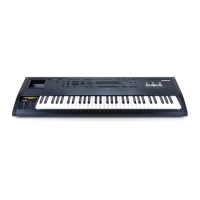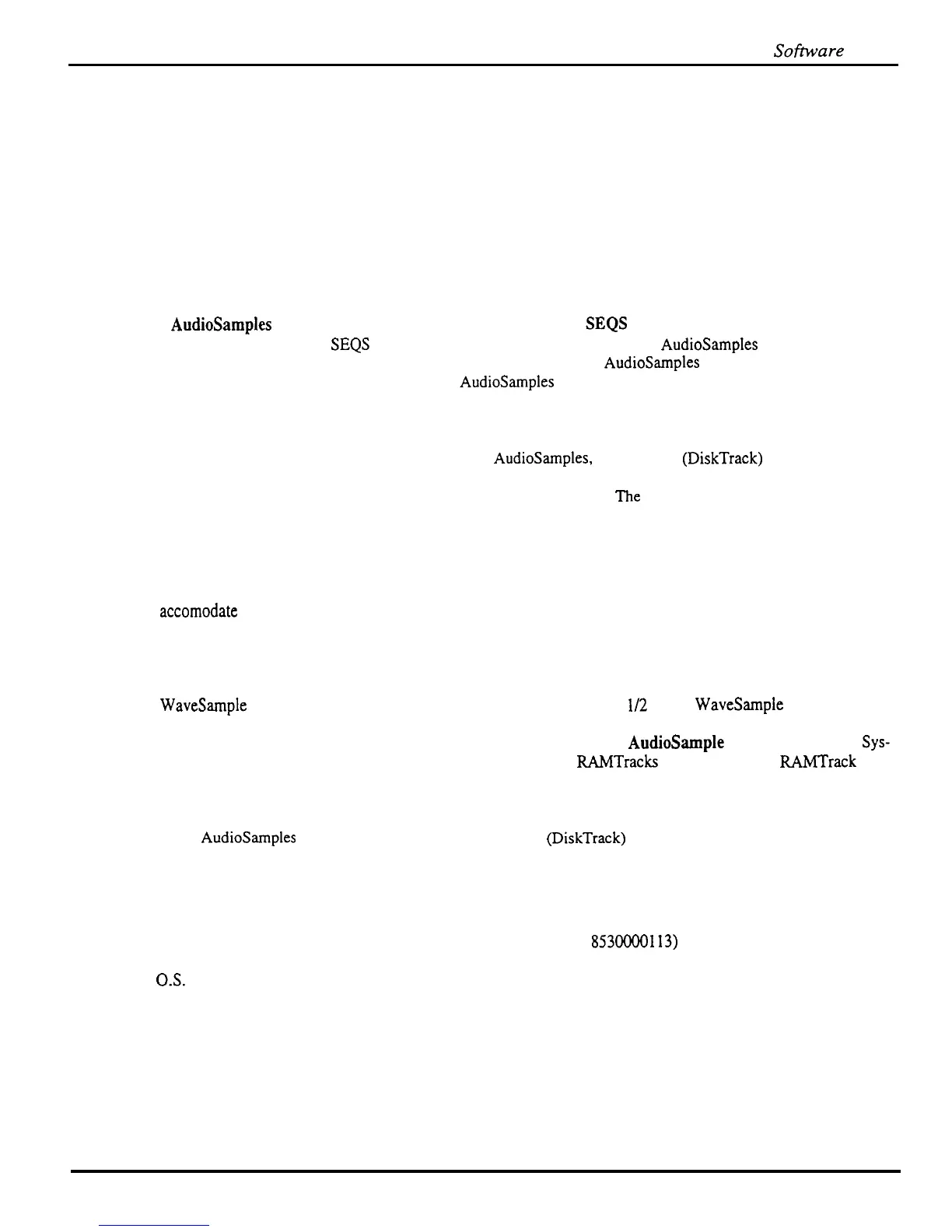SOB-ware
Notes
FILE OPERATION ERROR message when using COPY FLOPPY DISK command. When the COPY
FLOPPY DISK Command is forced to erase all memory to copy a disk (such as when all memory is used), the
ASR displayed a FILE OPERATION ERROR the first time that the command was invoked. Running the
command again resulted in normal operation. Fixed in Version 3.00.
Improper formatting of destination disk when using COPY FLOPPY DISK command. If destination disk is a
PC-formatted disk of the same density, the disk could be re-formatted as a g-sector ENSONIQ disk, which may
or may not match the source disk. If it doesn’t match, the copy may fail. Version 3.00 now ensures that the
destination disk inherits the same format as the source disk if formatting is required.
Memory Management Changes
RAM AudioSamples still resident after ERASE SONG AND ALL SEQS command. Effective in Version 3.00,
the ERASE SONG + ALL SEQS now releases all memory allocated to RAM AudioSamples and their directory.
This is a logical extension to this command, since the RAM-resident AudioSamples are intended to travel with
the song (project) file. Note that disk-resident AudioSamples are unaffected.
System does not release all memory in response to “ERASE MEMORY- OK?” prompt. When running any of
these commands: COPY FLOPPY DISK, COPY SCSI DRIVE, BACKUP/RESTORE, DAT BACKUP
RESTORE, and SYSEX RECORDER, The system only deleted resident instruments. Version 3.00 now frees
memory allocated by the sequencer memory, RAM
AudioSamples,
and the SCSI (DiskTrack) cache buffers.
Attempting to load an instrument that is larger than memory that is free or allocated to existing instruments
results in an invalid instrument. Subsequent edits result in lockup.
The
ASR- 10 is allocating an instrument
slot for the instrument to be loaded. If, the instrument cannot fit in memory (even after deleting all resident
instruments) the slot allocated for the instrument is never reset.
This results in an invalid instrument which will
lockup the system if an attempt is made to edit it. This problem has been addressed in Version 3.00.
Attempting to load an instrument that is larger than memory that is free or allocated to existing instruments
results in sequencer memory being erased. The ASR-10 would release all sequencer memory in an attempt to
accomodate
the instrument being loaded. This has been changed in Version 3.00 so that sequencer memory is
not erased automatically by the instrument load function.
System Exclusive
Sysex get wavesample overview command not returning 2nd half of wavesample in the overview block The
WaveSample Overview sys-ex command was only loading a picture of l/2 of the WaveSample selected. Fixed
in Version 3.00.
Sysex Recorder function fails when system memory contains large RAM AudioSample data. Invoking the
Sys-
Ex recorder when a large amount of memory is being used up by RAMTracks failed to erase the RAMTrack
memory when the response to the MUST ERASE MEMORY OK? prompt was YES. Subsequent Audio Track
recording could result in invalid error messages. Effective in Version 3.00, erasing memory via the Sysex
Recorder command results in the ASR-10 purging all resident instruments, all sequencer memory (including
RAM AudioSamples and directory), and releasing the SCSI (DiskTrack) cache buffers.
ASR-10 Version 3.08 Release Notes
The ASR- 10 Version 3.08 Operating System (DISK only) has been tested and is ready for release to production. All ASR-10
models (keyboard, rack, and keyboard with SCSI) will be getting this O.S. (p/n 853oooOll3) as a running change. The
EPROM update kit, which is included in the SP-3 and DI-10 service kits, will also pick up this change. For customer service
updates, the
OS.
Disk requires version 1 SO ROMs.
Note regarding Operating System size.
The Operating System size has not changed since Version 3.00. Customers who are upgrading from Version 2.5 1 will see
that the Operating System requires 160 more blocks. (See Version 3.00 release notes.)
Software Changes:
No new features have been added to this release. This release addresses the following problems that have been reported since
Version 3.00:
ASR Service Manual
33

